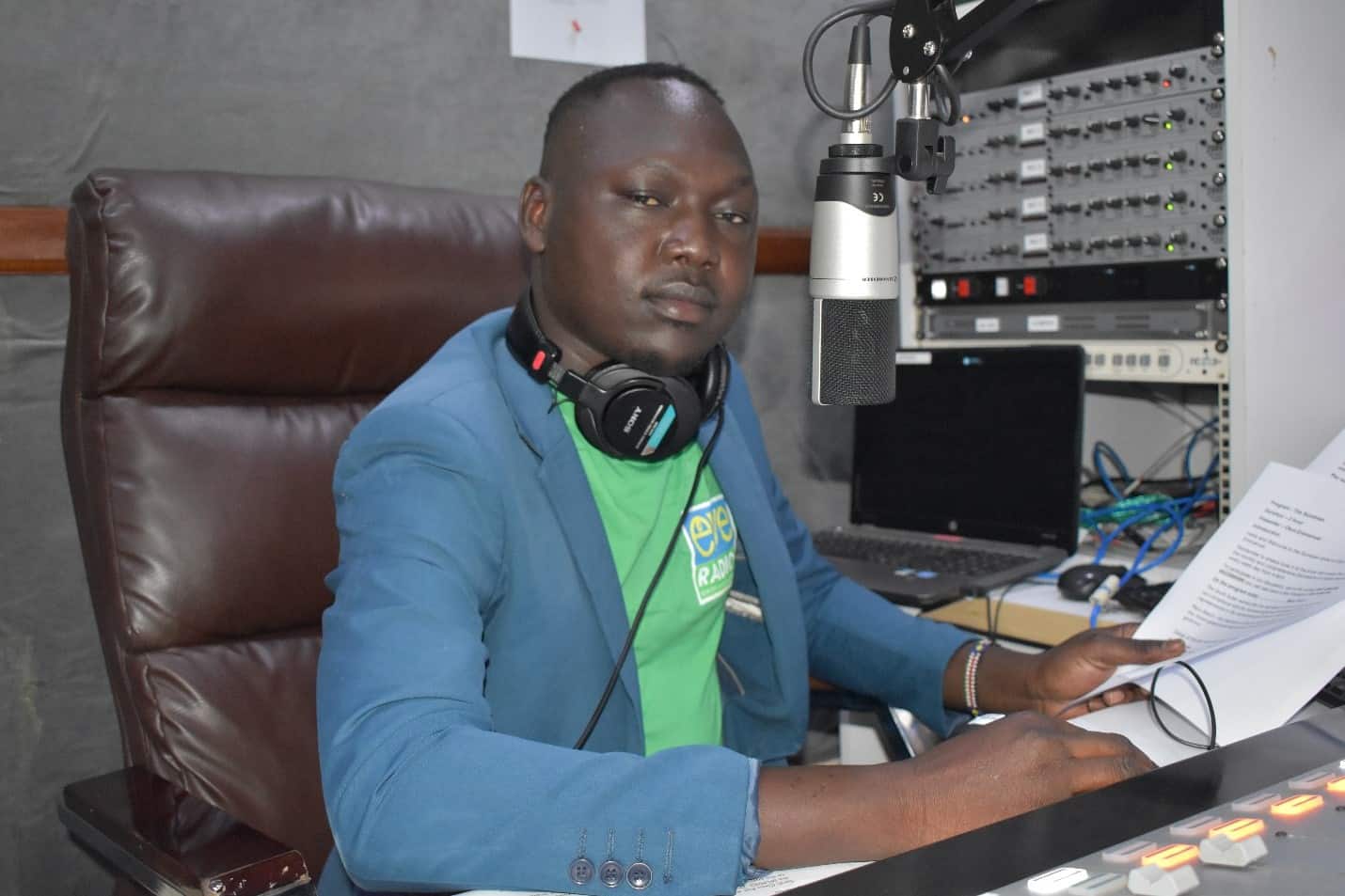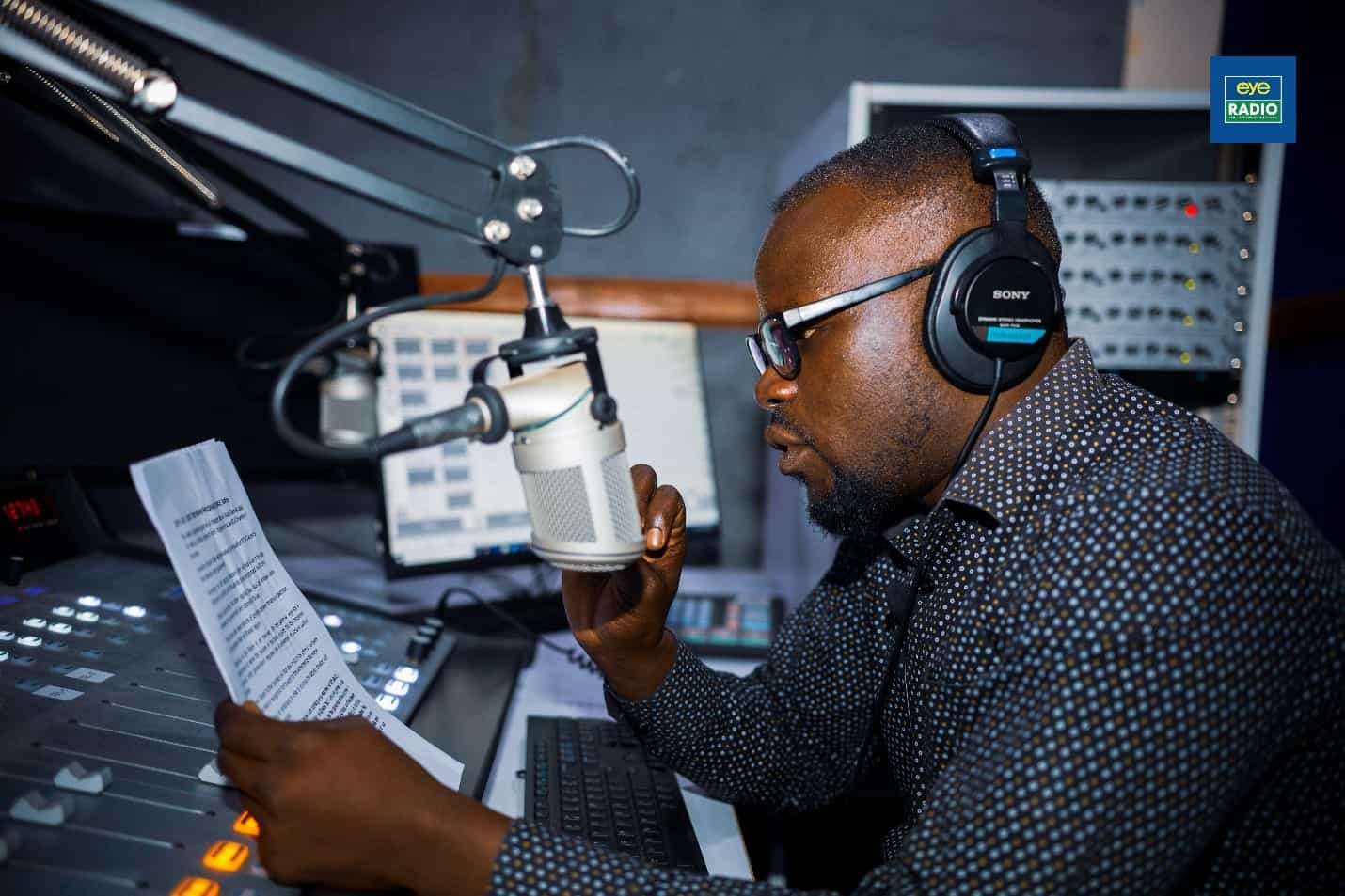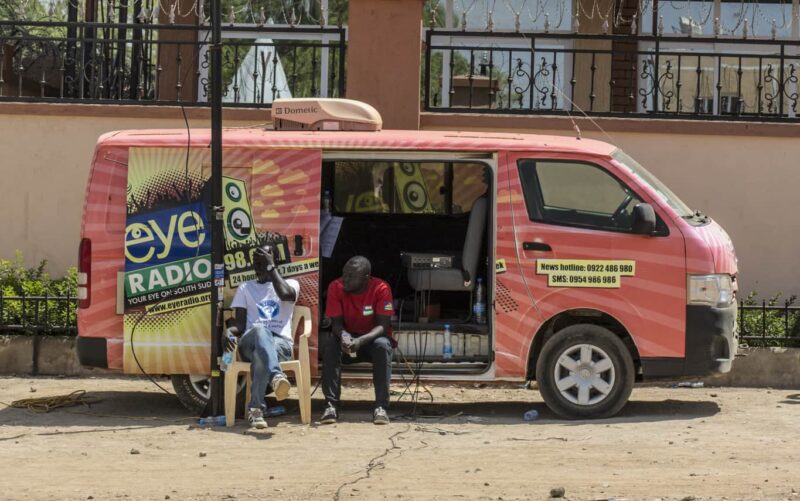When South Sudan registered its first case of COVID-19 on April 5, the senior management team at Eye Media in Juba, South Sudan quickly convened an all-staff meeting on how the organization could respond to the virus. Eye Media runs Eye Radio, the most popular radio station in the capital Juba and an Internews partner.
Like many workers adjusting to COVID-19 around the world, this meant staff would work remotely if possible. But the radio station couldn’t be operated only by remote workers. Eye Media CEO Stephen Omiri instructed staff to work in tightly scheduled shifts to allow for social distancing, with two exceptions – journalists Okot Emmanuel and Emmanuel Joseph would stay at the office.
For four months, Okot and Emmanuel lived at the studio, focused on getting as much information out to listeners, while keeping themselves isolated to limit the spread of the virus.
They shared a bedroom that had been set up at the station with bunkbeds and used the station’s kitchen to cook meals, sometimes buying food from nearby restaurants. But they spent most of the time in the newsroom.
“We stayed awake most of the night writing, recording, editing clips, updating the country on the status of COVID-19, and blowing the whistle on injustices, human rights abuses during the pandemic, state failures, and the skyrocketing commodity prices as well as the persistent devaluation of the South Sudanese pound against the US dollar,” Okot said.
“Most of the time, it was quiet in my room because everybody was gone. Just the two of us left behind. It was depressing, stressful, worrying, and tiring at the same time having to work round the clock,” he explained.

Isolated from family and friends
The two journalists both left family at home – for Emmanuel, his parents and siblings. “My family did not complain about my staying in the office because it is what the job requires and they understand the nature of my work.”
On the other hand, Okot’s family, including a wife and son, had some reservations. “They felt that my young family needed me, especially my son.” Some family members and neighbors were worried that he might contract and carry the virus because they heard him on the radio interviewing government officials, some of whom later tested positive for COVID-19.
“Some family was advising me to quit journalism, arguing that there is nothing worth my life,” said Okot.
But, said Emmanuel, “We needed to get accurate information about COVID-19 to our audience, as there had already been a wave of disinformation and hoaxes related to the virus.”

Information was desperately needed
Due to a lack of reliable power and Internet in South Sudan, radio is an especially important medium.
In addition to the two main current events programs they anchor, the morning Dawn at 7am and the evening Sundown at 4pm, the two journalists went live on the radio during the night hours to update citizens, in both English and Arabic, about new infections, deaths, recoveries, and preventive measures.
Thousands of COVID-19 scams and sites were emerging daily, such as the sale of counterfeit surgical masks and fake self-testing kits. Also, many South Sudanese believed that the government was fabricating the pandemic to attract funding.
As the pandemic progressed, Eye Radio’s audience started asking for more information about the virus, as well as entertainment to kill the boredom brought about by the lockdown.
The two journalists obtained information about the coronavirus from the World Health Organization, government agencies and international media outlets. They attended a daily 7:30 PM briefing held by South Sudan’s National Taskforce on COVID-19 at a local hotel.
They would fact-check the information before the live broadcast and before disseminating coronavirus information through the official Eye Radio twitter handle, Facebook, and website.
“It was challenging getting information from the taskforce and verifying it to get it out on time on the radio broadcast and social media,” Okot said.
A necessary sacrifice
Despite the unique challenge and stress of round-the-clock reporting and living at the station, it wasn’t even the first time Emmanuel or Eye Radio had operated this way. In July of 2016, Emmanuel was one of a few journalists who kept Eye Radio on the air by staying in the station for three days despite heavy fighting between the government and SPLA-IO forces near the Eye Media compound.
Staying at the station during this crisis “was a journey with a lot of hurdles but worth it,” said Okot.
Eye Media is a 100% South Sudanese media organization which receives support from the USAID-funded i-STREAM project, implemented by Internews.
(Banner photo: South Sudan commemorates World Radio Day in Juba. Credit: UNMISS/Flickr/CC)
